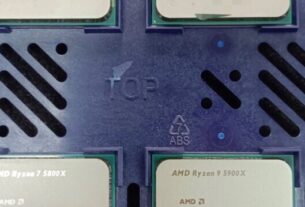
Intel is all set to launch its first discrete gaming graphics cards based on the Xe GPU architecture in 2021. Aimed at the enthusiast gaming market, the next-generation Intel Xe discrete graphics cards will feature all the goodies that one can expect within a modern gaming-oriented GPU such as ray tracing and tons of horsepower for 4K enthusiast tier performance.
Intel’s Xe-HPG GPU Powered Discrete Graphics Cards For Enthusiast Gaming Launching in 2021 – HW Accelerated Ray-Tracing, GDDR6 and Massive Amounts of Cores on 10nm Process
The bomb was dropped by none other than Videocardz who has reported that Intel is planning to launch its first discrete graphics card lineup specifically for the enthusiast gaming segment. It looks like Intel will be directly competing against AMD’s RDNA 2 and NVIDIA’s Ampere lineup which will be launching this year.
According to the leak, Intel’s gaming graphics card lineup will be powered by the Xe-HPG GPU. This specific GPU is another category within the Xe micro-architecture family. It falls between the Xe-LP and Xe-HP and is targeted primarily at the gaming audiences. The Xe-HPG GPU is expected to use a single tile and assuming that a single tile consists of 512 EUs, we are looking at up to 4096 cores on the flagship chip.

Based on our exclusive report and from what Intel has talked about in regards to its Ponte Vecchio chip, it looks like Intel is all onboard the MCM train with each chip consisting of several Xe GPU tiles that will be interconnected together to form a monster of a GPU. Here are the actual EU counts of Intel’s various MCM-based Xe HP GPUs along with estimated core counts and TFLOPs:
- Xe HP (12.5) 1-Tile GPU: 512 EU [Est: 4096 Cores, 10.6 TFLOPs 1.3 GHz, 150W]
- Xe HP (12.5) 2-Tile GPU: 1024 EUs [Est: 8192 Cores, 21.2 1.3 GHz, TFLOPs, 300W]
- Xe HP (12.5) 4-Tile GPU: 2048 EUs [Est: 16,384 Cores, 42.3 TFLOPs 1.3 GHz, 400W/500W]
Of course, Intel can opt for a higher EU count on its Xe-HPG gaming-specific GPUs but that remains to be seen until the final specifications are disclosed. As for the gaming-specific features, the Intel Xe-HPG powered graphics cards will feature hardware-accelerated ray tracing and feature GDDR6 memory to optimize performance and value whereas the Xe-HP lineup which is aimed at the data center market will opt for HBM memory.

The leak also talks about an Intel Xe-LP product known as SG1 which is a graphics card aimed at the server market. Little details are known of this part but it is expected by the end of 2020. Raja Koduri has already teased three massive GPU dies in ‘BFP’ (Big Fabulous Package) flavors which include all three Xe-HP variants. There’s no doubt that one of these chips shares the same design principles as the Xe-HPG which is based on the 1-tile design as the most entry-level Xe-HP part.
All Intel Xe-HPG GPUs are expected to be produced by an external foundry as the leaked information points. A likely candidate would be Samsung as it’s 10nm process has been in mass production for a while now.
Intel recently gave us the first demo of its Xe LP GPU inside its upcoming Tiger Lake CPUs which is proving to be a major leap in integrated graphics performance for Intel as seen in the demonstration. Expect more information on the Xe HP & Xe HPC GPUs in the coming months.



